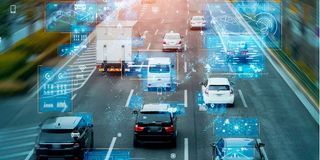Breaking News: Former Lugari MP Cyrus Jirongo dies in a road crash
Premium
Will AI reshape the trucking industry?

Computerisation is already a well-advanced component of trucking all over the world. Artificial Intelligence (AI) is an increasing part of that.
Hello Gavin, I'm a frequent reader of your Q&A segment in the DN2 Motoring magazine and your expertise has been extremely helpful to me when handling motoring issues. In this new AI (artificial intelligence) era, how is AI going to shape the trucking industry in Kenya?
— Daniel MK, Busia.
Computerisation is already a well-advanced component of trucking all over the world. So-called “Artificial Intelligence” (AI) is an increasing part of that. It is already having a profound impact on the efficiency of trucking operations, using more sophisticated algorithm programming and predictive capacity, and that will continue to develop. But it will not directly or singularly change the fundamentals of the industry, whose business is to transport large loads of goods from one place to another, by road. Trucking will still be trucking.
What computers (both with and without AI) are already doing is to optimise fleet logistics management. They have the data – what loads are to be carried, with what content, volume and weight; where is the cargo now and where does it have to go, on what timetable and deadlines; what are the numbers, capacities and special features of each truck in the fleet, and where they are right now.
Which loads should go on which trucks, what route should they take, and when they have delivered are there any new loads in those areas that they can pick up that are suitable for each particular truck so it doesn’t travel home without earning.
If there is redundancy capacity on some trucks and overloads on others, what is the optimum shuffle of assignments to minimise those problems, or to adjust to comply with driver availability and shift timing limits etc.?
These are eternal trucking-will-be-trucking issues that logistics managers used to work out all day with a pencil and paper (the most successful had a remarkable flair for that).
Now a computer can compare every option in a blink and suggest the best, while also considering the weather forecast, roadworks data on every route, any other traffic pinch-points and, with GPS location on every vehicle every second, report any disruptions to the plan…and suggest optimal solutions. And with the right AI algorithm programming, it could also remind the transport manager that it is his wife’s birthday and order a bunch of roses to be delivered to his house by a drone.
AI can do all these things all day and all night, every day and every night, instantly, because it has been told to and how. Not because it is “intelligent”.
Like all the things your mobile phone can do, but not because it is “smart” (modern mobiles have more processing capacity than the NASA space centre which first sent men to the moon).
Any “cleverness” belongs to its designers and programmers; the authors of the algorithms. Now that is “ingenious”, blended with obsessive-compulsive and bordering on insane.
Although so-called AI is near the leading edge of current computer technology, it is still based on the long-standing ability of computer hardware to gather and process enormous quantities of information at extraordinarily high speeds.
That’s all. In simple terms (which are the limit of my understanding) what it adds is software programmed to interconnect more sources of information, to use algorithms to make problem-solving calculations from that data, and potentially to instruct a panoply of different computerised robots to take certain actions, perhaps liaising with many other systems doing the same thing.
This seems to be the current zenith of what we have long called “automation”. The transformative change could be a combination of AI and robotics, which could replace truck drivers (and others) altogether. That won’t change the “shape” of the industry; merely dehumanise it.
There are already hundreds of such things in all of our lives in both piecemeal and coordinated ways. AI is not new “magic”. It does not “think”.
It “calculates”. It is not “intuitive” “wise” or “inventive” in its own right.
Certainly, it is taking already established computer processing to new heights of programming sophistication and capacity, with absolute obedience to a set of man-made rules. It does not have (and probably never will have) the capacity to deliberately or unilaterally break those rules with malicious intent.
What it will have is the capacity to wreak havoc if it is given defective or malevolent instructions.





